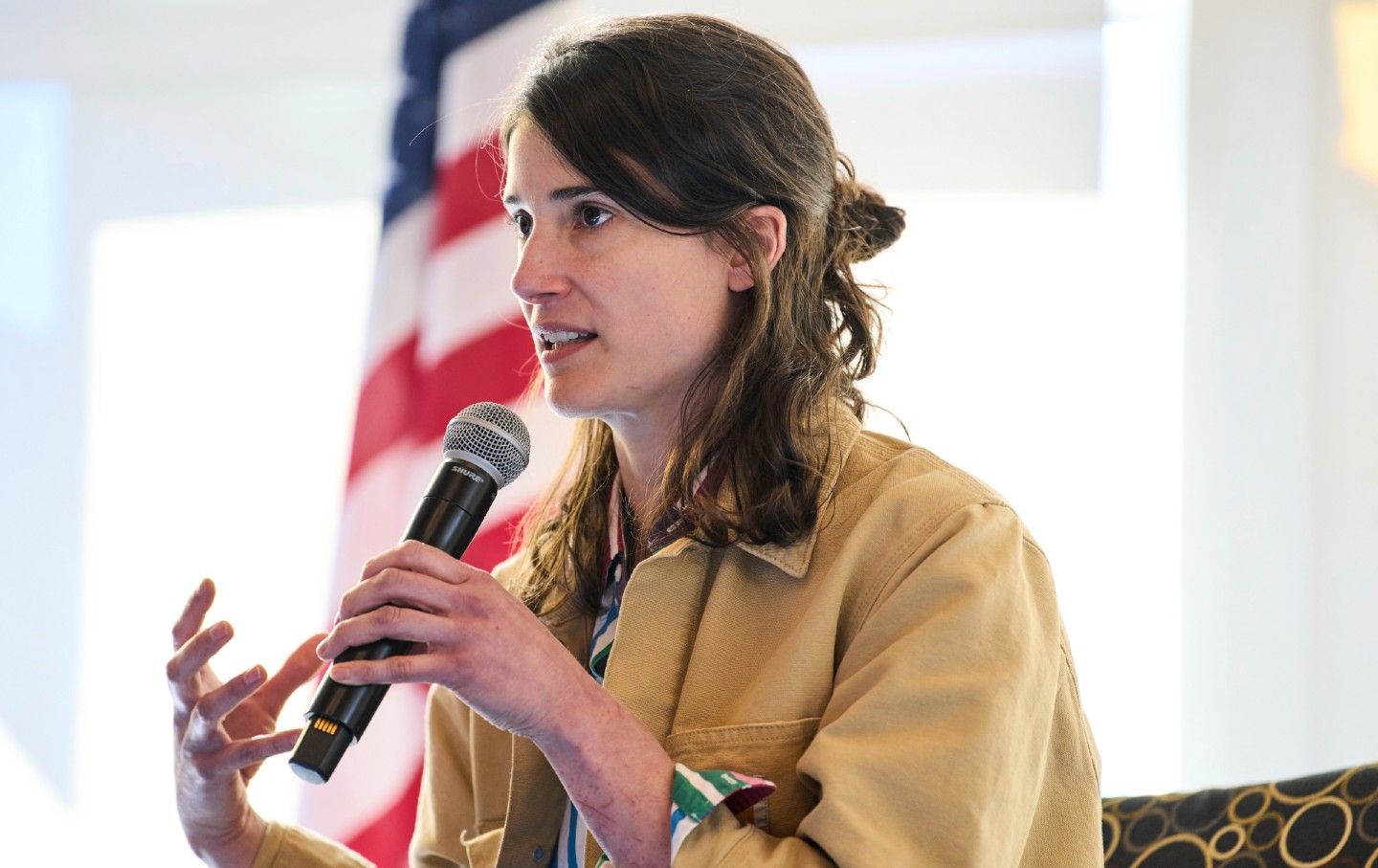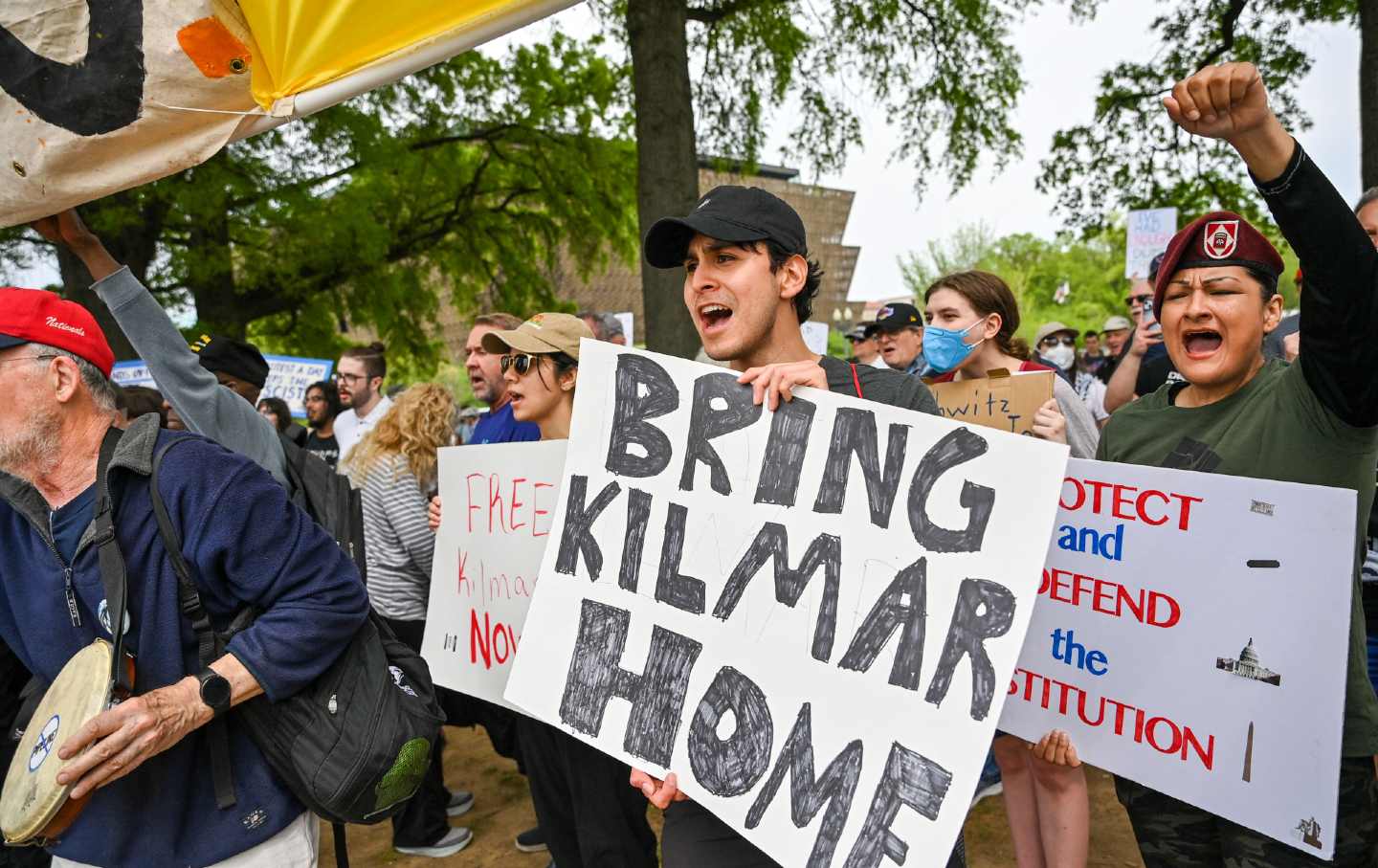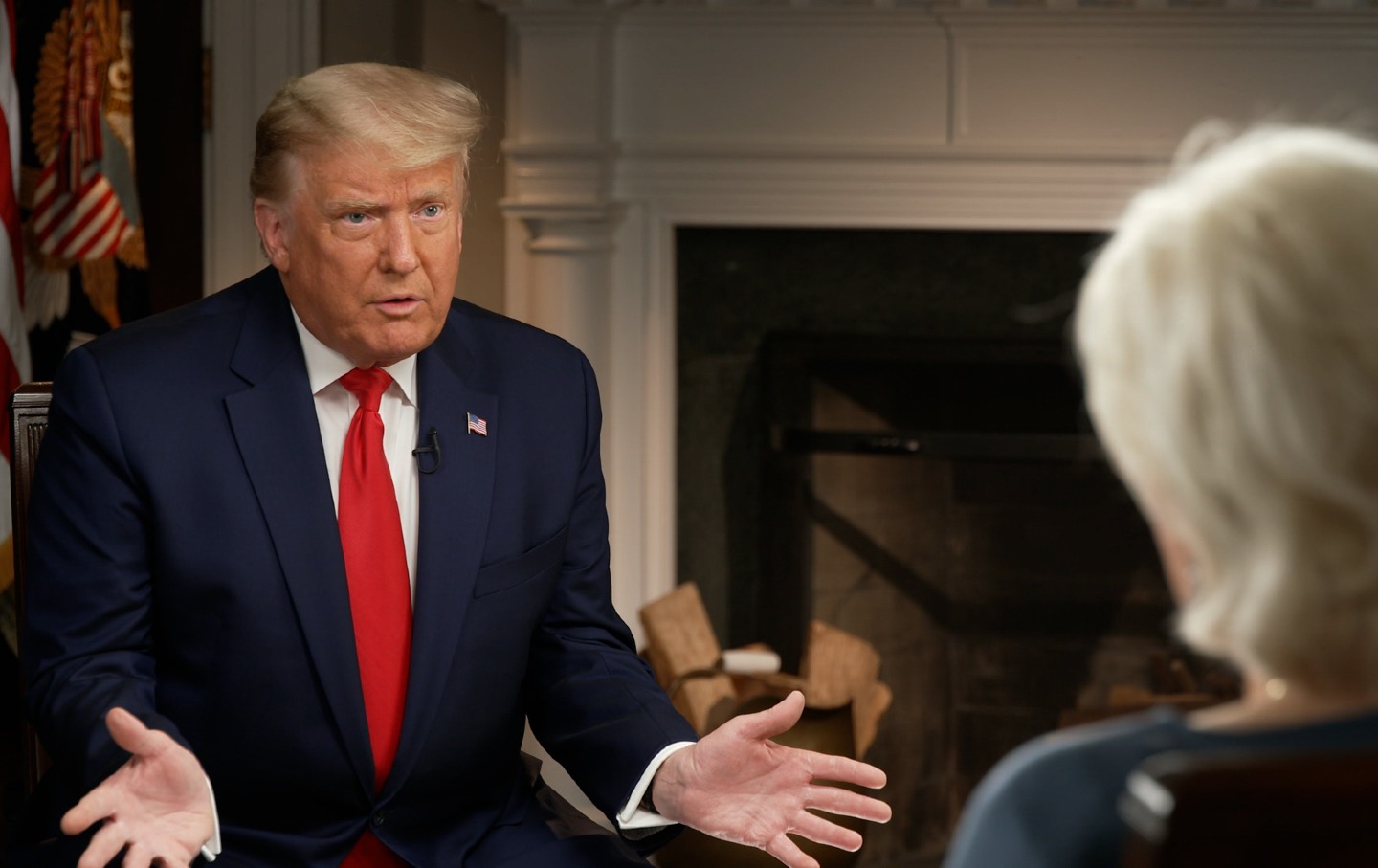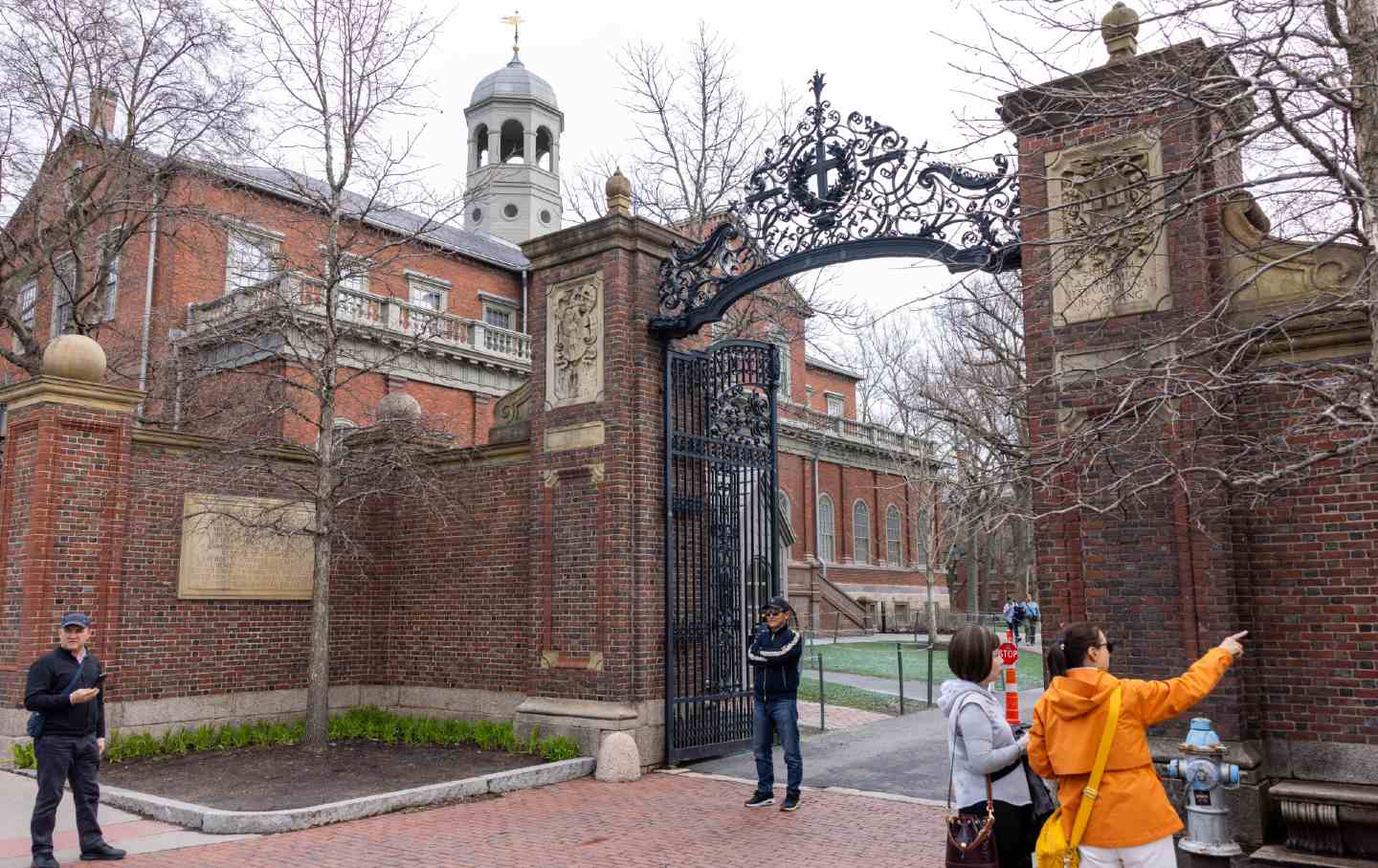Kamala Harris Needs to Meet the Moment and Reframe Our Poisonous Immigration Debate
The vice president has a chance to break the fever that has gripped US politics by giving a major speech defending Haitian Americans.
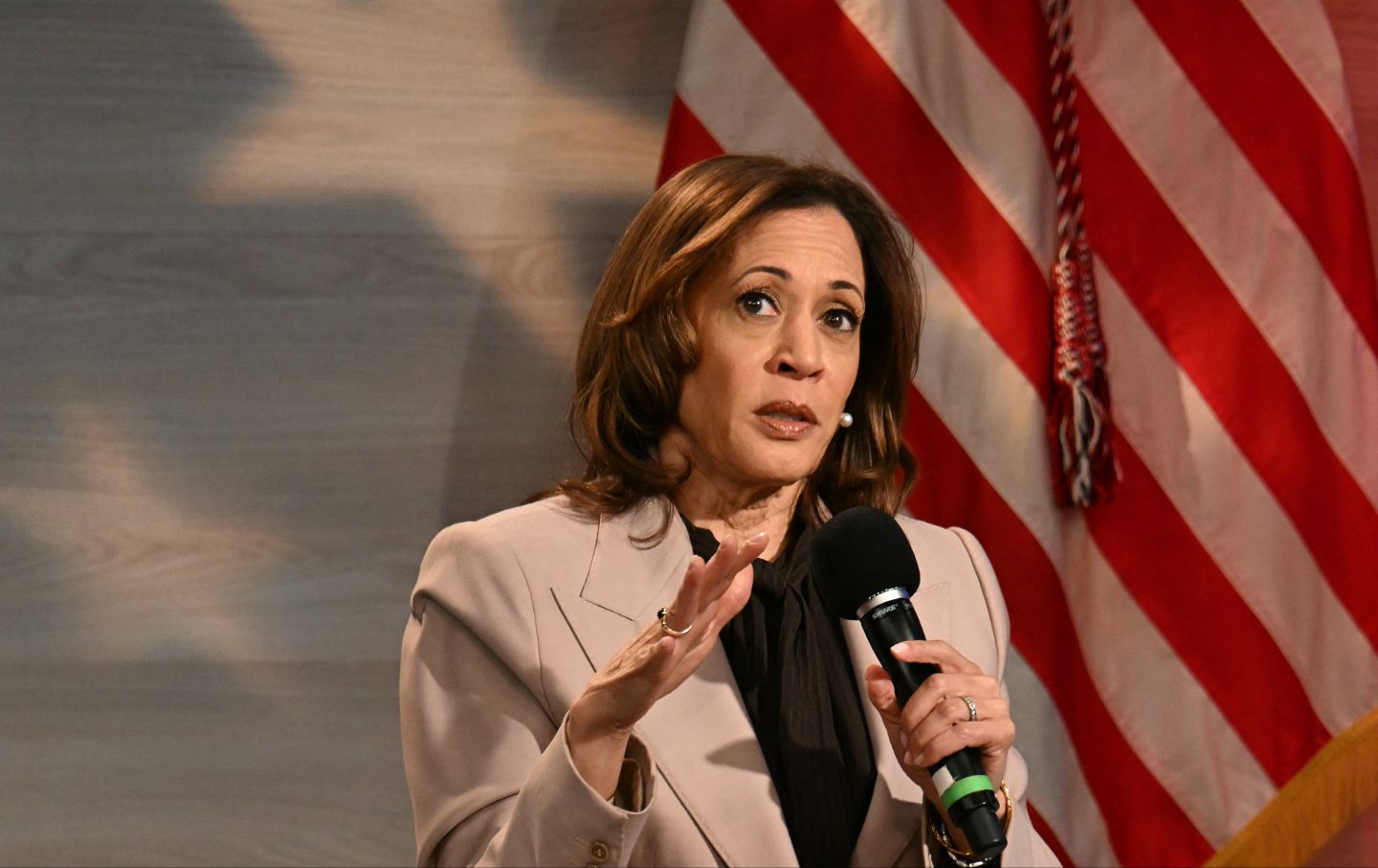
Kamala Harris speaks during a discussion hosted by the National Association of Black Journalists (NABJ), in Philadelphia, Pennsylvania, on September 17, 2024.
(Jim Watson / AFP via Getty Images)This is a dreadful moment in American politics—a crude juncture in the history of the nation. We’ve gotten to the point where the former president of the United States and his running mate on the Republican Party’s national ticket are spreading wild lies about immigrants eating pets in order to drive wedges of division into communities and the nation as a whole.
Yet this is not the first such dreadful moment in this country. We are a land with a painful history of political demagoguery. A century ago, the Ku Klux Klan gained a foothold in both major parties and was rapidly expanding its reach from the Jim Crow South into Northern states. Seven decades ago, Joe McCarthy was arguably the most influential figure in Washington, spreading a Red Scare that was shaking not just the politics but the culture of the country. Five decades ago, antigay hysteria was sweeping American cities and states, as referendums to overturn antidiscrimination laws and ban LGBTQ+ people from teaching were placed on ballots from Florida to California.
In each of those previous moments, there were fears that the United States was degenerating into such extremism and division that there was no way for a sane voice to be heard—let alone to prevail. But, eventually, in each case, the fever broke, in part because of courageous political figures who called America to its higher values.
Wisconsin Senator Robert M. La Follette, a presidential contender, mounted a 1924 campaign that decried the race hatred of the 1920s, and welcomed the support of the Black people, Jews, and Catholics who were targeted by the Klan. Maine Senator Margaret Chase Smith, a future presidential contender, delivered her “Declaration of Conscience” and challenged the McCarthyism of the 1950s. Just two years before he was elected president, Ronald Reagan, then the country’s most prominent conservative, became the most high-profile foe of a 1978 California initiative that proposed to fire openly gay and lesbian teachers, warning in widely circulated public statements that the measure threatened to infringe “on basic rights of privacy and perhaps even constitutional rights.”
None of those moves were made casually, or easily. In each circumstance, supposed “leaders” in the two major parties had looked the other way. Political counselors and strategists urged candidates to keep silent in order to preserve their electoral viability. Sometimes there were penalties for doing the right thing. But, more often than not, these acts of courage came to be seen as both morally sound and politically smart.
Today, Vice President Kamala Harris has a chance to break the fever of our latest demagogic moment, a moment in which anti-immigrant hatred—grounded in lies about Springfield, Ohio, but amplified as part of a national campaign—is being whipped up by Senator JD Vance (R-OH) and Donald Trump on a level that rivals the insanities, the bigotries, and the threats of some of the ugliest periods of American history.
Harris, as both the sitting vice president and her party’s presidential nominee, should seize the opening to reframe the debate about immigration with a speech—perhaps one delivered in a community with a large immigrant population; perhaps in an academic or religious setting; certainly with an eye toward capturing the attention of voters of every background, region, ideology and partisanship.
Harris has already established herself as 2024’s adult in the room, the serious contender who tries to keep the campaign discussion focused on facts, figures, and policies while her Republican rivals go off the rails. That’s one of the reasons Harris was widely seen as the winner of last week’s presidential debate with Trump, and why she now leads in most polls. With that said, she is still engaged in a highly competitive race. And she clearly recognizes that the Trump-Vance ticket’s wide-eyed xenophobia is not an issue she can let go unaddressed. So the Democrat has begun to respond forcefully to the falsehoods that Trump and Vance are spewing.
In her compelling interview Tuesday with members of the National Association of Black Journalists, Harris was asked about the racist conspiracy theories that top Republicans have peddled about Haitian immigrants in Springfield.
“It’s a crying shame, literally, what’s happening to those families, those children in that community,” Harris said, referencing the Springfield elementary school students who had to be evacuated on the day when school pictures were supposed to be taken.
Harris spoke eloquently about how she learned early in her political career that she had “a public trust…to be responsible in the way that you use your words, much less how you conduct yourself.” She decried Trump’s refusal to accept that responsibility as a former president seeking a new term. She warned against “these serious threats that are being issued against a community that was living a productive good life before this happened,” and said that people are stirring anti-immigrant sentiment in Springfield by “spewing lies that are grounded in tropes that are age-old.”
“This is not new. This is not new in terms of these tropes. This is not new in terms of where it’s coming from,” Harris explained, before detailing Trump’s record of promoting racist untruths for personal and political purposes—including his calls for the execution of the Central Park Five and his peddling of “birther lies” about former President Barack Obama.
“The American people deserve and, I do believe, want better than that,” said Harris. “I know, the vast majority of Americans know, we have so much more in common than what separates us. I know that. I know that regardless of someone’s background, their race, their gender, their geographic location, I know that people are deeply troubled by what is happening to that community in Springfield, Ohio. You cannot be entrusted with standing behind the seal of the president of the United States of America, engaging in that hateful rhetoric that, as usual [with Trump], is designed to divide us as a country—is designed to have people pointing fingers at each other. It’s designed to do that. And I think that most people in this country, regardless of their race, are starting to see through this nonsense, and to say, ‘Let’s turn the page on this. It’s exhausting and it’s harmful.’”
Harris is right.
More importantly, she is establishing a strong, and necessary counter to Trump’s immigration demagoguery.
This is a message she should build out.
Yes, of course, a case may be made that what Harris said on Tuesday was sufficient, and that she does not need to add anything more to her sharp rebuke of the madness that Trump and Vance have unleashed. But America needs more.
This is less about traditional campaigning tactics than it is about doing something rare—yet very important—in a perilous election season when the polls are still too close for Democrats to feel comfortable. This is a point where Harris can lead, and help get some of the poison out of our immigration politics. If she were to deliver a high-profile address that cuts through the Republican lies, puts the truth forward, defends immigrants and communities that are threatened, outlines a real plan for humane and forward-looking immigration reform, and calls the country to embrace the highest ideals of what Democratic President John F. Kennedy celebrated as “a nation of immigrants,” she could elevate the national debate at a point in which it is descending into the maelstrom.
Trump will never stop talking about immigration. It is his signature issue, the one that he has always exploited for political purposes. And, as he struggles to keep his campaign above water, Trump’s talk will continue to escalate.
That’s partially how we got to our current toxic moment. On stage last week, in his first debate with Harris, Trump amplified baseless claims by Vance and others that Haitian immigrants were creating chaos in Ohio, with the outlandish declaration that “in Springfield, they are eating the dogs. The people that came in, they are eating the cats. They’re eating—they are eating the pets of the people that live there.” Even as mountains of evidence were produced to debunk the lies, Trump and Vance doubled down. Ohio Republican US Senate candidate Bernie Moreno joined the cacophony, arguing, falsely, that immigration had “absolutely devastated Springfield, Ohio.”
This anti-immigrant hate-mongering has been linked to bomb threats, closures of public buildings, and the cancellation of community events. Haitian families are afraid to leave their homes in a city where they are legally present, enriching their communities, and contributing to the economy as workers and small-business owners. White supremacists have shown up to exploit the crisis that Trump, Vance, and Moreno have created.
It has gotten so bad that the Republican mayor of Springfield, Rob Rue, complained over the weekend. “Any political leader that takes the national stage and has the national spotlight needs to understand the gravity of the words that they have for cities like ours, and what they say impacts our city,” Rue, who said he was tired and angry, told Politico. “And we’ve had bomb threats the last two days. We’ve had personal threats the last two days, and it’s increasing, because the national stage is swirling this up. Springfield, Ohio, is caught in a political vortex, and it is a bit out of control. We are a wonderful city—a beautiful town. And for what it’s worth, your pets are safe in Springfield, Ohio.”
And this crisis is not just in Springfield. Across the country, Haitian community leaders say that immigrants are living in fear, as are other immigrants from the Caribbean and around the world.
Unfortunately, the political chaos and contention that has emerged is precisely what Trump and Vance want.
Confronted with the facts—Ohio Republican Governor Mike DeWine dismissed the “eating the pets” line as “garbage that was not true”—Vance was unrepentant, even going so far as to suggest that he was consciously manufacturing propaganda about immigrants to advance his political crusade. “The American media totally ignored this stuff until Donald Trump and I started talking about cat memes,” he announced on CNN Sunday. “If I have to create stories so that the American media actually pays attention to the suffering of the American people, then that’s what I’m going to do.”
Trump and Vance are determined to dictate the narrative — not just for the debate about immigration but for the broader campaign.
Popular
“swipe left below to view more authors”Swipe →But Harris does not have to let them do that.
She can chart a course that moves the debate in the direction of the truth. To do this, however, she needs to do more than respond to the latest reports of Republican irresponsibility. She needs to be bold. She should offer a model of presidential leadership by delivering an address to the nation that Americans—even those who may have had doubts about her candidacy—can embrace as a call for sanity in a moment of political madness.
Hold the powerful to account by supporting The Nation
The chaos and cruelty of the Trump administration reaches new lows each week.
Trump’s catastrophic “Liberation Day” has wreaked havoc on the world economy and set up yet another constitutional crisis at home. Plainclothes officers continue to abduct university students off the streets. So-called “enemy aliens” are flown abroad to a mega prison against the orders of the courts. And Signalgate promises to be the first of many incompetence scandals that expose the brutal violence at the core of the American empire.
At a time when elite universities, powerful law firms, and influential media outlets are capitulating to Trump’s intimidation, The Nation is more determined than ever before to hold the powerful to account.
In just the last month, we’ve published reporting on how Trump outsources his mass deportation agenda to other countries, exposed the administration’s appeal to obscure laws to carry out its repressive agenda, and amplified the voices of brave student activists targeted by universities.
We also continue to tell the stories of those who fight back against Trump and Musk, whether on the streets in growing protest movements, in town halls across the country, or in critical state elections—like Wisconsin’s recent state Supreme Court race—that provide a model for resisting Trumpism and prove that Musk can’t buy our democracy.
This is the journalism that matters in 2025. But we can’t do this without you. As a reader-supported publication, we rely on the support of generous donors. Please, help make our essential independent journalism possible with a donation today.
In solidarity,
The Editors
The Nation



